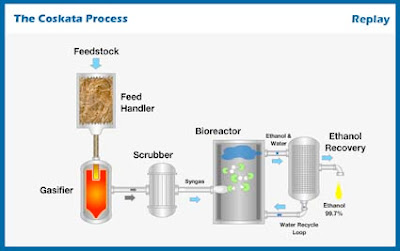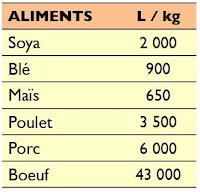
Graphic - fresh water, a resource to preserve. (Photo: Wikimedia Commons )
One of the main arguments put forward against biofuels is the high consumption of fresh water to produce, at least with current technologies. But by doing the right way, the plug-in hybrid cars of tomorrow will consume less than one liter of water per day.
Take a midsize car that normally consumes 8 liters of gasoline per 100 kilometers. If it is operated with 85% ethanol (E85), the largest commercial concentration, you will then need 11.2 gallons of E85 (including 9.6 liters of ethanol) to travel 100 km. The required amount is greater due to the fact that ethanol contains only 2 / 3 of the chemical energy of gasoline, for a given volume.
Now if E85 fuel to produce this one takes the corn in Nebraska, we know that corn requires 780 liters of irrigation water per liter of ethanol produced (see my book Driving without oil for more details). In addition about 4 to 5 liters of water per liter of ethanol to the needs of the manufacturing plant. In total, 785 liters of water are required for each liter of ethanol produced.
Thus, our traditional mid-size car powered by E85 ethanol in Nebraska consumes 7,500 liters of water per 100 km. This represents about 4100 liters of water a day for someone who would travel 20000 km per year. We now understand very well why many environmentalists are not warm to the idea!
But before throwing out the baby with the bathwater, let's see how we can come to consume less than one liter of water per day!
For this, we must of course use energy crops that do not need watering, as the tall grass prairie wildlife, including switchgrass (switchgrass). We saw in another post these weeds have roots 3 meters deep very effective in capturing soil moisture.
Furthermore, we also saw in another post , that plug-in hybrid cars advances will consume 4 times less fuel than conventional cars when they operate in fuel mode. But as these cars of tomorrow will travel 80% of their kilometers on electricity, they will actually consume 20 times less fuel.
Now we mentioned above a car through traditional operating with 85% ethanol requires about 10 liters of ethanol per 100 km. Advanced plug-in hybrid cars of tomorrow will therefore require only 0.5 litres/100 km on average (20 times), corresponding to 0.28 liters of ethanol per day for an annual mileage of 20000 km .
Finally, new ethanol plants will reduce their water consumption to about 3 liters of water per liter of ethanol produced through new technologies such as, inter alia, that developed by the Quebec company Vaperma . This innovative company has developed molecular filters that can separate water from ethanol without the need for distillation. They can save up to 45% of the energy normally used in an ethanol plant, while consuming less water. The decrease in CO2 emissions is also significant.
 Illustration - Filter molecular Company Vaperma to separate water from ethanol without distillation. The filters are made of polymeric membranes in the form of hollow fibers that combines to form the filter cartridges.
Illustration - Filter molecular Company Vaperma to separate water from ethanol without distillation. The filters are made of polymeric membranes in the form of hollow fibers that combines to form the filter cartridges.
Moreover, for sectors thermochemical (pyrolysis, gasification) the manufacturing of biofuels consume, in turn, less than 2 liters of water per liter of biodiesel produced.
There is also a new channel hybrid thermo-biological put forward by the company Coskata, which uses microorganisms to convert the synthesis gas (mixture of CO, H2 and CO2), from a thermal process (gasification) in ethanol. According Coskata, the process consumes less than one liter of water per liter of ethanol produced! That's less than petrol . To achieve such performance, Coskata does not use distillation, but a process of molecular filtration for separating water from ethanol, probably similar to the filters Vaperma. In addition, the Coskata process has no drying residues, like those found in traditional ethanol plants, to make the meal sold as a dietary supplement protein in the livestock industry. The distillation of beer (mash) and dry tailings are two processes that consume more water by evaporation.
 Illustration - thermobiologique method of manufacturing ethanol company Coskata (Source: Coskata).
Illustration - thermobiologique method of manufacturing ethanol company Coskata (Source: Coskata).
Ultimately, our advanced plug-in hybrid car traveling 20,000 km / year (16000 km electricity) will consume less than one liter of water per day, using biofuel made from grass Indians do not require watering, and manufactured with the right technology!
To put this water consumption in our car tomorrow it is interesting to know the water consumption per kilogram for various foods. The following table summarizes the results found in the book by David Pimentel and MH Pimentel, Food Energy and Society , CRC Press, 2008. It shows that we need 43,000 liters of water to produce 1 kg of beef, more than 6000 liters of water per 150 grams steak ! This is not a liter of water per day of our car that will endanger our freshwater resources. Too large portion of meat in our diet, particularly red meat, is much more worrying in this respect ...
 Illustration - Number of gallons of water required to produce a kilogram of different foods, depending on the work of David Pimentel, professor of ecology and agriculture at Cornell University.
Illustration - Number of gallons of water required to produce a kilogram of different foods, depending on the work of David Pimentel, professor of ecology and agriculture at Cornell University.
One of the main arguments put forward against biofuels is the high consumption of fresh water to produce, at least with current technologies. But by doing the right way, the plug-in hybrid cars of tomorrow will consume less than one liter of water per day.
Take a midsize car that normally consumes 8 liters of gasoline per 100 kilometers. If it is operated with 85% ethanol (E85), the largest commercial concentration, you will then need 11.2 gallons of E85 (including 9.6 liters of ethanol) to travel 100 km. The required amount is greater due to the fact that ethanol contains only 2 / 3 of the chemical energy of gasoline, for a given volume.
Now if E85 fuel to produce this one takes the corn in Nebraska, we know that corn requires 780 liters of irrigation water per liter of ethanol produced (see my book Driving without oil for more details). In addition about 4 to 5 liters of water per liter of ethanol to the needs of the manufacturing plant. In total, 785 liters of water are required for each liter of ethanol produced.
Thus, our traditional mid-size car powered by E85 ethanol in Nebraska consumes 7,500 liters of water per 100 km. This represents about 4100 liters of water a day for someone who would travel 20000 km per year. We now understand very well why many environmentalists are not warm to the idea!
But before throwing out the baby with the bathwater, let's see how we can come to consume less than one liter of water per day!
For this, we must of course use energy crops that do not need watering, as the tall grass prairie wildlife, including switchgrass (switchgrass). We saw in another post these weeds have roots 3 meters deep very effective in capturing soil moisture.
Furthermore, we also saw in another post , that plug-in hybrid cars advances will consume 4 times less fuel than conventional cars when they operate in fuel mode. But as these cars of tomorrow will travel 80% of their kilometers on electricity, they will actually consume 20 times less fuel.
Now we mentioned above a car through traditional operating with 85% ethanol requires about 10 liters of ethanol per 100 km. Advanced plug-in hybrid cars of tomorrow will therefore require only 0.5 litres/100 km on average (20 times), corresponding to 0.28 liters of ethanol per day for an annual mileage of 20000 km .
Finally, new ethanol plants will reduce their water consumption to about 3 liters of water per liter of ethanol produced through new technologies such as, inter alia, that developed by the Quebec company Vaperma . This innovative company has developed molecular filters that can separate water from ethanol without the need for distillation. They can save up to 45% of the energy normally used in an ethanol plant, while consuming less water. The decrease in CO2 emissions is also significant.
 Illustration - Filter molecular Company Vaperma to separate water from ethanol without distillation. The filters are made of polymeric membranes in the form of hollow fibers that combines to form the filter cartridges.
Illustration - Filter molecular Company Vaperma to separate water from ethanol without distillation. The filters are made of polymeric membranes in the form of hollow fibers that combines to form the filter cartridges. Moreover, for sectors thermochemical (pyrolysis, gasification) the manufacturing of biofuels consume, in turn, less than 2 liters of water per liter of biodiesel produced.
There is also a new channel hybrid thermo-biological put forward by the company Coskata, which uses microorganisms to convert the synthesis gas (mixture of CO, H2 and CO2), from a thermal process (gasification) in ethanol. According Coskata, the process consumes less than one liter of water per liter of ethanol produced! That's less than petrol . To achieve such performance, Coskata does not use distillation, but a process of molecular filtration for separating water from ethanol, probably similar to the filters Vaperma. In addition, the Coskata process has no drying residues, like those found in traditional ethanol plants, to make the meal sold as a dietary supplement protein in the livestock industry. The distillation of beer (mash) and dry tailings are two processes that consume more water by evaporation.
 Illustration - thermobiologique method of manufacturing ethanol company Coskata (Source: Coskata).
Illustration - thermobiologique method of manufacturing ethanol company Coskata (Source: Coskata). Ultimately, our advanced plug-in hybrid car traveling 20,000 km / year (16000 km electricity) will consume less than one liter of water per day, using biofuel made from grass Indians do not require watering, and manufactured with the right technology!
To put this water consumption in our car tomorrow it is interesting to know the water consumption per kilogram for various foods. The following table summarizes the results found in the book by David Pimentel and MH Pimentel, Food Energy and Society , CRC Press, 2008. It shows that we need 43,000 liters of water to produce 1 kg of beef, more than 6000 liters of water per 150 grams steak ! This is not a liter of water per day of our car that will endanger our freshwater resources. Too large portion of meat in our diet, particularly red meat, is much more worrying in this respect ...
 Illustration - Number of gallons of water required to produce a kilogram of different foods, depending on the work of David Pimentel, professor of ecology and agriculture at Cornell University.
Illustration - Number of gallons of water required to produce a kilogram of different foods, depending on the work of David Pimentel, professor of ecology and agriculture at Cornell University.
0 comments:
Post a Comment